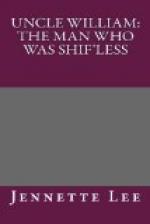“If I’d ‘a’ married her, I’d ‘a’ seen things sooner,” went on the old man. “I didn’t see much beauty them days—on sea or land. I was all for a good ketch and makin’ money and gettin’ a better boat. And about that time she died. I begun to learn things then—slow-like—when I hadn’t the heart to work. If I’d married Jennie, I’d ‘a’ seen ’em sooner, bein’ happy. You learn jest about the same bein’ happy as you do bein’ miserable—only you learn it quicker.”
“I can’t give up my art,” said the young man. He was looking at Uncle William with the superior smile of youth, a little lofty yet kind. “You don’t allow for art,” he said.
“I dunno’s I do,” returned Uncle William. “It’s like makin’ money, I guess—suthin’ extry, thrown in, good enough if you get it, but not necessary—no, not necessary. Livin’s the thing to live for, I reckon.” He stopped suddenly, as if there were no more to be said.
The artist looked at him curiously. “That’s what all the great artists have said,” he commented.
Uncle William nodded. “Like enough. I ain’t an artist. But I’ve had sixty year of livin’, off and on.”
“But you’ll die poor,” said the artist, with a glance about the little room. He was thinking what a dear old duffer the man was—with his curious, impracticable philosophy of life and his big, kind ways. “You’ll die poor if you don’t look out,” he said again.
“Yes, I s’pose I shall,” said Uncle William, placidly, “’thout I make my fortune aforehand. That hot water looks to me just about right.” He eyed the tea-kettle critically. “You hand over them glasses and we’ll mix a little suthin’ hot, and then we’ll wash the dishes and go to bed.”
The artist looked up with a start. “I must be getting back.” He glanced at the dark window with its whirling sleet.
“You won’t get back anywheres to-night,” said Uncle William. “You couldn’t hear yourself think out there—let alone findin’ the path. I’ll jest shake up a bed for ye here on the lounge,—it’s a fust-rate bed; I’ve slep’ on it myself, time and again,—and then in the mornin’ you’ll be on hand to go to work—save a trip for ye. Hand me that biggest glass and a teaspoon. I want that biggest there—second one—and a teaspoon. We’ll have things fixed up fust-rate here.”
Far into the night the artist watched the ruddy room. Gleams from the fire darted up the wall and ran quivering along the red. Outside the wind struck the house and beat upon it and went back, hoarse and slow.
Down the beach the surf boomed in long rolls, holding its steady beat through the uproar. When the wind lulled for a moment the house creaked mysteriously, whispering, and when the gale returned a sound of flying missiles came with it. Now and then something struck the roof and thudded to the ground with heavier crash.
About three o’clock Uncle William’s round face was thrust through the crack of the door. “You can go to sleep all right, now,” he said soothingly. “There wa’n’t but seven bricks left in the chimney, anyhow, and the last one’s jest come down. I counted ’em fallin’.”




